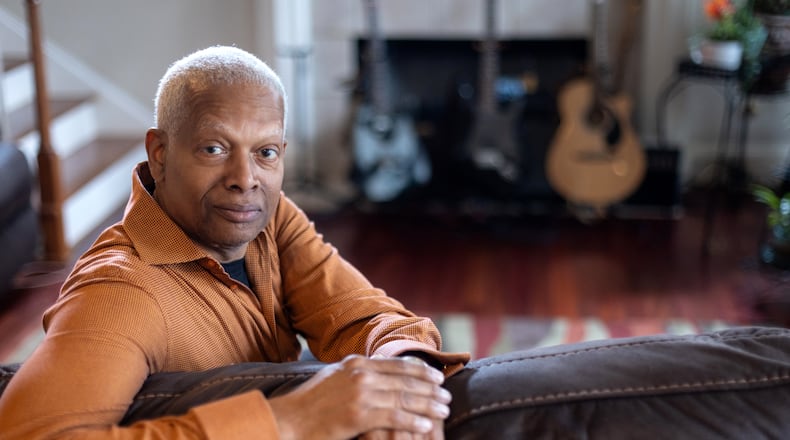Hank Johnson is not just a fan of music; he is an amateur musician who soothes his visions of stardom with daily rock-out sessions at his house in Lithonia.
The nine-term Democratic congressman from Georgia’s 4th District developed his love for music and musicians of all genres playing drums for bands in grade school and college. And his musical interest has shown up frequently over the years in his work in Washington, where he has been a fierce protector of artists’ rights to free expression and speech.
“If you get into my car and scan my favorites on XM Radio, you’ll see all kinds of genres of music represented that, from time to time, I want to listen to,” he said in an interview with The Atlanta Journal-Constitution. “I believe that we are a better culture when everyone’s First Amendment rights are protected and we can get whatever kind of music that we like.”
Johnson says that music enhances the cultures, and that is especially true when it comes to Black music and hip-hop. He has worked to protect it over nearly two decades in Congress, using his position to push for laws that protect artists.
Johnson is one of the main sponsors of the Restoring Artistic Protection Act, a proposed law that would make it illegal for lyrics to be cited in federal cases involving musicians unless certain criteria is met. In Fulton County, prosecutors have cited lyrics as part of their racketeering case against members of a group known as Young Slime Life or YSL, which prosecutors characterize as a gang but defendants describe as a record label.
Last month, Johnson stood with other Democrats to launch the Congressional Hip-Hop Power and Justice Task Force. That initiative aims to give voice not just to hip-hop artists in preserving their artistic freedoms but to highlight the social and justice issues that have been a hallmark of hip-hop music since its inception five decades ago.
“This is what the task force is designed to be in the vanguard of,” Johnson said. “It’s protecting this cultural form on all fronts and promoting it, as well. Hip-hop is not all about drugs, money and guns and women. There’s a lot of social commentary that is done via rap.”
The task force is the brainchild of New York U.S. Rep. Jamaal Bowman, who said his goal is to serve as a bridge between musicians and industry executives and the lawmakers who set policies affecting artists and dealing with the issues represented in the music.
“Now it’s time to organize formally and bring into the halls of Congress the power and the transformative nature of hip-hop culture,” Bowman said during a news conference last month. “Our goal is to make sure the hip-hop community has a seat at the table as we work on federal policy.”
Standing alongside Bowman and Johnson were Atlanta-based music executive Willie “Prophet” Stiggers, a co-founder of the Black Music Action Coalition, an organization that tackles diversity issues within the industry; and the Rev. Lennox Yearwood, who leads the Hip-Hop Caucus, an organization that aims to connect the hip-hop community to civics and political advocacy.
Both men said Johnson has long been a champion of hip-hop as an art form that reflects the lived experience of many Black people. Yearwood said he has worked with Johnson since he was first elected to the U.S. House in 2006.
“I do think that one of the great things I’ve seen with him is understanding that it’s about the culture,” Yearwood said. “It’s bigger than just the music or the dance. And it’s about how do you use one’s cultural expression to shape one’s political experience.”
Stiggers said Johnson cares deeply about the power of music and protecting those who bring it to the world.
“I understand and really appreciate his commitment to the artist community overall beyond just hip-hop,” Stiggers said. “Just his appreciation and willingness to use his seat to help protect the artist community as a whole, I just think it’s something powerful.”
Through the new task force, Johnson said he wants to protect and promote hip-hop. He and the other organizers say rap music can also help shape conversations about poverty, housing, education and health care.
Most important to Johnson is centering the First Amendment rights of rappers to express themselves in their lyrics without those words being used against them later. He cited the popularity of rap music, a genre that in recent years dominates the charts and is considered the most popular more among consumers with more spins and streams than rock or country.
“Artists are now being prosecuted based on the creative content that they produce, while at the same time people are making money off of that same content,” Johnson said. Artists in other musical genres don’t face the same attacks, he said.
Johnson put his drumsticks away for a few years while he built his career as an attorney. He picked the hobby back up in the 1990s, and he recently started taking guitar lessons on weekends when he has time on his schedule.
Despite his beginner status, he has a collection of acoustic and electric guitars and keeps at least one in his office in Washington where he can strum out tunes between meetings. Music is his constant companion, he said.
“I secretly desire to be good enough to perform,” he said. “One day.”
About the Author
Keep Reading
The Latest
Featured



